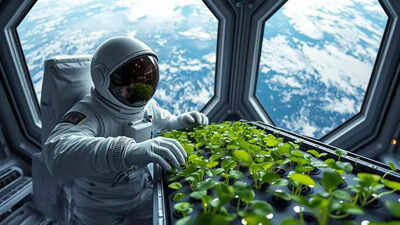
NEW DELHI: Indian astronaut Shubhanshu Shukla, currently aboard the International Space Station (ISS), took on the unusual role of a space farmer in the final days of his mission. Shukla has been capturing photographs of moong and methi seeds sprouting in petri dishes and placing them into a storage freezer as part of a key experiment on seed germination in microgravity.
After 41 Years, India Back In Space As Axiom-4 Takes Shubhanshu Shukla To ISS, Parents Get Emotional
The experiment is a collaboration between Indian research institutions, led by Ravikumar Hosamani of the University of Agricultural Sciences, Dharwad, and Sudheer Siddapureddy of the Indian Institute of Technology, Dharwad. It aims to study how microgravity affects seed germination and early plant development.“I am so proud that Isro has been able to collaborate with national institutions all over the country and come up with some fantastic research which I am doing on the station for all the scientists and researchers.
It is exciting and a joy to do this,” Shukla said in a conversation with Axiom Space chief scientist Lucie Low.The sprouts will be brought back to Earth and cultivated over several generations to understand how space conditions may have altered their genetics, microbial interactions, and nutritional value, Axiom Space said in a statement as quoted by news agency PTI. In addition to the seed experiment, Shukla has also been working with microalgae, which are being explored for their ability to produce food, oxygen and biofuels in space.
Their strength and flexibility make them promising candidates for sustaining human life on long-term missions.Shukla also contributed to a crop seed experiment involving six plant varieties that will be grown over multiple generations. “Right from doing stem cell research and looking at the effect of microgravity on seeds, evaluating the cognitive load on astronauts while they are interacting with screens onboard the station.
It has been fantastic. I feel proud to be this kind of a bridge between the researchers and the station and do the research on behalf of them,” he said.“One particular research I am really excited about is stem cell research where scientists are trying to explore whether it is possible to accelerate recovery or growth or repair injury by adding supplements to stem cells. It has been great to work in the Glove Box doing this research for them.
I am really excited to be doing this,” Shukla added.Shukla is part of the Axiom-4 mission, which has spent 12 days aboard the ISS. The team is expected to return to Earth after July 10, depending on weather conditions off the Florida coast. Nasa has not yet announced a final undocking date, but the mission could last up to 14 days.

 6 hours ago
34
6 hours ago
34




























 English (US)
English (US)